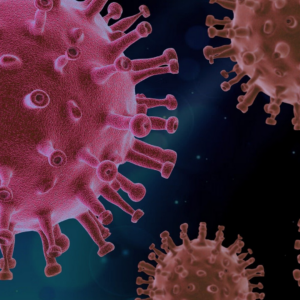Chris Wright, International Ministries Director reflects biblically on the corona virus outbreak
“If you think you’re too small to make a difference, you’ve never spent a sleepless night with a single mosquito.” So runs the saying we learned while living in India. Tiny things punch way above their weight. And a virus is a lot smaller than a mosquito.

In fact, viruses are among the smallest life forms on our planet. Somewhere between 20-400 nanometres, a hundred times smaller than bacteria, and too small to see even with a normal microscope. You’ll need an electron microscope to spot a corona virus, or COVID-19, as we must now call it, like somebody out of Star Wars. But what an impact that infinitesimally small organism has made! In the space of a few weeks – and with our help of course – it has circled the globe, shut down whole cities and humbled whole countries. Economies are stalling, stocks falling, businesses struggling, travel disrupted, sports events cancelled, many lives lost and many more put on hold, holidays ending in virtual imprisonment… the list goes on. It really is staggering that something so tiny can have such devastatingly vast consequences.
The Book of Proverbs notices that size is no indicator of importance or impact.
“Four things on earth are small, yet they are extremely wise: Ants are creatures of little strength, yet they store up their food in the summer; hyraxes are creatures of little power, yet they make their home in the crags; locusts have no king, yet they advance together in ranks; a lizard can be caught with the hand, yet it is found in kings’ palaces.” (Prov. 30:24-28).
I wonder what Agur might have said if he’d known about viruses. Perhaps, ‘A virus cannot be seen, yet it can bring the world to a halt.’
Isaiah reflects more pointedly on just how fragile are all human power, glory, wealth, skills and abilities – when it comes to the crunch. In comparison with the enduring strength of the Creator God, even the greatest nations on earth can crumble before a virus and their leaders be reduced to impotent embarrassment – if not swept away altogether in the end, who knows.

Surely the nations are like a drop in a bucket;
they are considered as dust on the scales;
he weighs the islands as though they were fine dust.
Before him all the nations are as nothing;
they are considered by him as worthless and less than nothing.
He brings princes to naught
and reduce the rulers of this world to nothing.
No sooner are they planted,
no sooner are they sown,
no sooner do they take root in the ground,
than he blows on them and they wither,
and a whirlwind sweeps them away like chaff. (Isa. 40:15-17, 22-24).
Our first question might be, why do viruses exist at all in God’s good creation? Not to mention all the other little nasties that do us such harm? And I cannot give a clear biblical answer to that. Of course, we know that we live in a world that is not as God intended it to be, as a result of our sin and God’s curse. Creation itself suffers and is subject to frustration, and we suffer within it, not immune to all the ways that death invades and threatens life, as God told us it would.
Judgement?
Might it then be God’s judgment? I think we can never make simplistic assertions like that, or we may be joining Job’s friends in mistakenly dumping pious sounding theology on top of people’s ‘innocent’ suffering. But it is certainly a warning. As Jesus pointed out to those who wondered if people who had been killed in some building accident were worse sinners than others. Not at all, said Jesus, but it is a warning that all of us stand very close to perishing and need to be in a right relationship with God through repentance and faith (Lk. 13:1-5). Life is so fragile. A virus. A microbe. An unwashed hand. An innocent close encounter with an infected friend who doesn’t even know it – and sickness or death kicks down the door.
So what do we learn from this global crisis?
Folly
First, the devastating results of human folly. Being careful, again, not to point fingers of judgment, there does seem something prima facie unwise about the practices of Chinese ‘wet markets’, with living and dead animals of many wild and domestic species mixed up together with raw meat and fish. Many warnings have been made about the potential for zoonotic diseases to transfer from animals to humans in such conditions, but the practice goes on. Though the clean-unclean food rules in Leviticus had theological rationale, there was some divine hygienic wisdom in avoiding dead flesh of wild creatures coming in contact with human hands, clothes and vessels, and the insistence on ritual washings if it did happen (Lev. 11). God knew about viruses rather a long time before we did.
And then, the notorious and momentous folly of the treatment of Dr Li Wen Liang who first spotted the strange new virus in Wuhan and warned colleagues, but was threatened and silenced by the authorities, instead of being heeded – and then tragically died himself through serving infected patients.
Fear

Secondly, it is extraordinary what levels of fear this tiny organism has generated. Not that we shouldn’t be properly afraid of anything that brings sickness and potentially death. But so far the percentage mortality to infection rate seems to be within single figures. That is no comfort, of course, to the very elderly or people already in poor health. But the majority of us, it seems at present, if infected are likely to recover. This is not the Black Death. Nor even one of the more lethal ‘flu’ outbreaks of previous years. And yet global fear has exploded, causing as much collateral damage as the virus itself. At such a time, it is good for Christians to recall that ‘God has not given us a spirit of fear, but of power and of love and of a sound mind’ (2 Tim. 1:7, NKJV).
Hatred and stigma
Thirdly, and tragically as so often, a crisis like this brings out the worst (as well as sometimes the best) in human beings. I’d not heard the word ‘Sinophobia’ before, but apparently it really is a thing, and well documented – ‘hatred and fear of the Chinese’. Like anti-Semitism, it has no rational basis, but is extremely ugly. Chinese (and other east Asian peoples) have been vilified, spat on in the streets, verbally abused as ‘viruses’, cruelly ostracised – and reports of such behaviour can be found all over the world. The all too visible virus of human inhumanity to one another is as endemic – more virulent and destructive indeed – than the viruses too small for the eye to see. And just as ancient. It was before the Flood, and the reason for it, that ‘the Lord saw how great the wickedness of the human race had become on the earth, and that every inclination of the thoughts of the human heart was only evil all the time’ (Gen. 6:5). I doubt if God observes anything different thousands of years later.
So what should we do in response?
I write this in late February and by the time you read it in April, things may have changed dramatically, one way or another. But obviously, we should take all the reasonable precautions that the medical authorities impress upon us. And equally obviously, we must pray. We pray for those already suffering the illness, or bereaved by it. We pray for protection for ourselves and our loved ones, trusting in God’s sovereign goodness while knowing our eternal salvation is not the same as earthly immunity from the common woes of humankind. We pray for the medical and political authorities, for success in the race to develop a vaccine, and for greater wisdom in practical response to such things. We pray for a far greater cultural humility, that will replace our arrogant hybris with a healthy dose of realism about our human capacity to ‘subdue the earth’ – when the earth itself fights back against our human follies, whether through rogue viruses or climatic chaos. And above all, we persevere in faith and hope in the overruling sovereignty of God – the Lord of creation and Ruler of the nations, the God of Psalm 46. ‘God is our refuge and strength, an ever-present help in trouble. Therefore we will not fear…’
